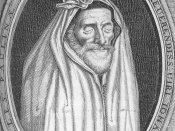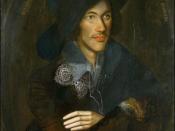The four poems are; ÃÂElegy for HimselfÃÂ by Chidiock Tichborne, ÃÂDeath, Be Not ProudÃÂ by John Donne, ÃÂOde on the Death of a Favourite Cat Drowned in a Tub of Gold FishesÃÂ by Thomas Grey and ÃÂSongÃÂ by Christina Rossetti.
Each of the writers has different views on death and the afterlife. They might think there is nothing, they might think that eternal life follows death or they might just not know. Their views maybe influenced by religion, death of a loved one or the impending death of themselves but which ever it is, it has significant effect on the poem.
ÃÂElegy for HimselfÃÂ and ÃÂDeath Be Not ProudÃÂ are both written by Roman Catholic men (Chidiock Tichborne and John Donne respectively) Chidiock TichborneÃÂs poem was written in exceptional circumstances because he was only hours from his execution when he penned. Strangely this isnÃÂt noticeable in the poem as it is very tightly structured and the rhyme is perfect and what the rhyme does do is create a solemnness.
From the poem you can immediately tell that he feels that he has wasted his life; for example the connectives he repeats for each line; either ÃÂbutÃÂ, ÃÂand yetÃÂ, or ÃÂand nowÃÂ, especially in the line ÃÂAnd now I live, and now my life is done,ÃÂ. The ÃÂbutsÃÂ and ÃÂyetsÃÂ Show to me that he has not come to terms with his execution because he still feels that what he was doing before he was imprisoned was the right thing considering he was strong Roman Catholic. Chidiock Tichborne effectively presents his views by making the reader fell sorry for the writer. Lines like ÃÂMy feast of joy is but a dish of pain.ÃÂ are especially touching if you use his perspective.
ÃÂDeath, Be Not ProudÃÂ is similar...


